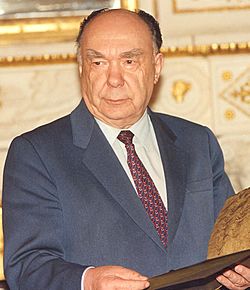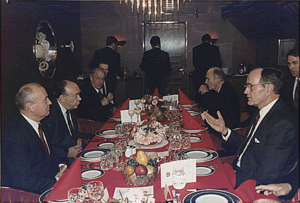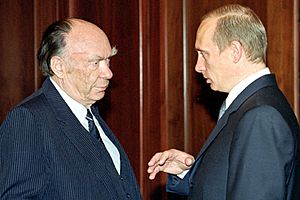Alexander Yakovlev facts for kids
Quick facts for kids
Alexander Yakovlev
|
|
|---|---|
|
Александр Яковлев
|
|
 |
|
| Head of the Propaganda Department of the Communist Party of the Soviet Union | |
| In office 5 July 1985 – March 1986 |
|
| Preceded by | Vladimir Stepakov |
| Succeeded by | Yuri Sklyarov |
| Full member of the 27th Politburo of the Communist Party of the Soviet Union | |
| In office 26 June 1987 – 14 July 1990 |
|
| Member of the 27th Secretariat of the Communist Party of the Soviet Union | |
| In office 6 March 1986 – 14 July 1990 |
|
| Soviet Union Ambassador to Canada | |
| In office 1 June 1973 – 29 October 1983 |
|
| Premier | Alexei Kosygin Nikolai Tikhonov |
| Preceded by | Boris Miroshnichenko |
| Succeeded by | Aleksei A. Rodionov |
| Personal details | |
| Born | 2 December 1923 Korolyovo, Yaroslavl Oblast, Russian SFSR, Soviet Union (now Russia) |
| Died | 18 October 2005 (aged 81) Moscow, Russia |
| Political party | Communist Party of the Soviet Union (1944–1991) Russian Party of Social Democracy (1995–2002) |
| Signature | |
| Military service | |
| Allegiance | |
| Branch/service | Soviet Navy |
| Years of service | 1941–1943 |
| Battles/wars | |
Alexander Nikolayevich Yakovlev (Russian: Алекса́ндр Никола́евич Я́ковлев; 2 December 1923 – 18 October 2005) was an important politician, diplomat, and historian from the Soviet Union and later Russia. He was a key member of the Communist Party of the Soviet Union in the 1980s. Many people called him the "godfather of glasnost" because he was a major thinker behind Mikhail Gorbachev's big reform plans, known as glasnost (openness) and perestroika (restructuring).
Yakovlev grew up in a farming family. He fought in World War II as a marine and joined the Communist Party after the war. During the time of Nikita Khrushchev, he became part of the party's main committee. He later studied in the United States as part of the Fulbright Program. When Leonid Brezhnev was in charge, Yakovlev worked in the propaganda department. He was later sent to be the ambassador to Canada because he spoke out against nationalism in the Soviet Union.
In the early 1980s, Yakovlev came back to the Soviet Union and strongly supported Mikhail Gorbachev's ideas for change. Because of his important role in these reforms, some hardline politicians criticized him. He eventually left the Communist Party just before a coup attempt in 1991. During the coup, Yakovlev supported those who wanted democracy. He later supported Boris Yeltsin, but then disagreed with Vladimir Putin when he felt democracy was weakening in Russia.
Contents
Early Life and Education
Alexander Yakovlev was the first of five children, born into a farming family in a small village called Korolyovo, near the Volga River. He had four sisters, but two of them died when they were babies. His father went to school for only four years, and his mother for just three months. Alexander was often sick as a child. His father was a strong supporter of communism and fought in the Russian Civil War. He became the first leader of a local collective farm. When Alexander was seven, their house burned down, and his family moved to a new place.
Serving in World War II
Yakovlev finished high school just before Nazi Germany invaded the Soviet Union in 1941. He joined the Soviet Navy in November 1941 after a short training. He became a platoon commander in the Soviet Marine Corps and fought on the Volkhov Front during the Siege of Leningrad. On August 6, 1942, he was leading 30 soldiers when he was badly wounded while attacking German positions. He stayed in the hospital until February 1943 and was then released from the military. He joined the Communist Party of the Soviet Union in 1944. At that time, he believed strongly in the Communist Party and was very loyal to the Soviet Union and Joseph Stalin.
Changes Under Stalin and Khrushchev
In September 1945, Yakovlev went back to school to study history at the Yaroslavl Pedagogical Institute. He got married the same year. After graduating, he went to Moscow to attend a special party school. In November 1946, he became an instructor in the Department of Propaganda in Yaroslavl. It was around this time that he started to have doubts about the government. He was shocked to see trains full of Soviet prisoners of war being sent to labor camps. This memory stayed with him and made him question things.
In March 1953, after Stalin died, Yakovlev was assigned to the party's Central Committee. A big moment for him was in February 1956, when Nikita Khrushchev gave his "Secret Speech." In this speech, Khrushchev criticized Stalin's harsh rule. After this speech, Yakovlev became less enthusiastic about communism. He wanted to study the original ideas of communism from thinkers like Karl Marx and Vladimir Lenin. He eventually realized that the ideas of Marxism-Leninism were not practical or humane. This helped him make sense of his feelings after Khrushchev's speech, and he began to agree with Khrushchev's views.
Studying in the United States
In 1958, Yakovlev was chosen to be an exchange student at Columbia University in the United States for one year, as part of the Fulbright Program. He was one of seventeen Soviet students, and most of them were chosen by the KGB (the Soviet secret police). Yakovlev studied English, and learned about American history, especially the New Deal program. At the end of his year, he traveled around the United States. However, his time in America did not make him less critical of the country. He saw things like greed and racism that he didn't like. Yakovlev returned to the Central Committee to work on ideas and propaganda. He wrote several books that were critical of the United States. In July 1960, he earned a degree similar to a doctorate for his work on US foreign policy.
Early Political Career and Time in Canada
In July 1965, Leonid Brezhnev appointed Yakovlev as the first deputy head of the Propaganda Department of the Communist Party. In August 1968, Yakovlev was sent to Prague and saw Soviet tanks entering the city during the Warsaw Pact invasion of Czechoslovakia. He later spoke out against removing the leader, Alexander Dubček. That same year, he was put in charge of a group that was writing a new constitution. Yakovlev worked as an editor for party newspapers and became the head of the party's Department of Ideology and Propaganda from 1969 to 1973. In January 1970, he visited the United States again and met people like Ronald Reagan and Henry Kissinger. This trip also did not change his negative views of the United States.
Time as Ambassador to Canada
In 1972, Yakovlev took a brave step by writing an article called "Against Antihistoricism." In this article, he criticized Russian nationalism and nationalism in the Soviet Union. Because of this, he was removed from his important job. He was given the choice of a diplomatic job, which was a way of sending him away from Moscow. He chose to be the ambassador to Canada, and he stayed there for ten years. He arrived in Canada in July 1973. During his time there, he became good friends with Canadian Prime Minister Pierre Trudeau. Trudeau's second son, Alexandre Trudeau, was even named after Yakovlev.
From May 16 to 23, 1983, Yakovlev went with Mikhail Gorbachev on a trip to Canada. At the time, Gorbachev was in charge of agriculture in the Soviet Union. They visited Canadian farms and agricultural schools to learn things that could help the Soviet Union. During this trip, Yakovlev and Gorbachev became friends again. They started to talk carefully about the idea of making the Soviet Union more open and free.
Returning to the Soviet Union
Two weeks after their visit, Gorbachev helped Yakovlev return to the Soviet Union. Yuri Andropov called him back from Canada. On August 16, 1983, Yakovlev became the Director of the Institute of World Economy and International Relations in Moscow. His friend Yevgeny Primakov took over his role in 1985. Yakovlev was impressed by Canada's free economy, especially its farming, which was a weak area for the Soviet Union. He also liked the benefits of the rule of law in Canada.
Perestroika

When Gorbachev became the leader of the Communist Party of the Soviet Union in 1985, Yakovlev became a senior advisor. He helped shape the Soviet Union's foreign policy by saying that the Soviet Union should not interfere in Eastern Europe. He also went with Gorbachev to his five meetings with United States President Ronald Reagan. In the summer of 1985, Yakovlev became the head of the propaganda department for the Communist Party. In the Soviet Union, he strongly supported the reform programs known as glasnost (openness) and perestroika (restructuring). He played a very important role in making these policies happen.
In 1987, a Russian group called Pamyat sent a letter criticizing Yakovlev. They called him the main person behind changes that would make the Soviet Union give in to other countries.
For many years, the Soviet Union officially denied that there was a secret agreement connected to the Nazi–Soviet Pact. At Mikhail Gorbachev's request, Yakovlev led a group to investigate if such a secret agreement existed. In December 1989, Yakovlev found that the agreement did exist and told the Soviet Parliament about it. As a result, the Soviet Parliament, which had been newly elected, officially said that the secret agreements existed and condemned them.
Later Life and Legacy
Yakovlev was promoted to the Politburo in 1987, which was a very powerful group. However, by 1990, he was being attacked by hardline communists in the party who were against his liberal ideas. At a big party meeting in July 1990, a politician named Alexander Lebed asked Yakovlev how many "faces" he had, meaning he was being two-faced. Yakovlev was embarrassed but continued. He resigned from the Politburo the day after the meeting. As the communists who opposed reforms became stronger, his position became more difficult. He was strongly criticized by Gennady Zyuganov in May 1991. He then resigned from the Communist Party two days before the August Coup in 1991. During the coup, Yakovlev joined those who were against it and supported democracy. After the coup failed, Yakovlev blamed Gorbachev for being too trusting of the people who planned the coup.

Yakovlev led Boris Yeltsin's group that worked to clear the names of people who were unfairly punished during Soviet political repression. After the Soviet Union broke apart, Yakovlev wrote many books and gave many talks about history, politics, and economics. He led the Russian Party of Social Democracy, which later joined with other reform groups. In 2002, as the head of a committee for victims of political repression, he announced the release of a CD with names and short life stories of people who suffered during Soviet purges. In his later life, he started the International Democracy Foundation. He believed that Russia needed to take responsibility for the past crimes of communism. He also criticized President Vladimir Putin for limiting democracy.
Honours and Awards
- Order of Merit for the Fatherland, 2nd class
- Order of the October Revolution
- Order of the Red Banner
- Order of the Patriotic War, 1st class
- Order of the Red Banner of Labour, three times
- Order of Friendship of Peoples
- Order of the Red Star
- Order of Venerable Sergius of Radonezh, 3rd class (Russian Orthodox Church, 1997)
- Great Officers Cross of the Order of Merit of the Federal Republic of Germany
- Commander of the Order of Merit of the Republic of Poland
- Commander of the Order of the Lithuanian Grand Duke Gediminas (Lithuania)
- Knight Grand Cross of the Order of the Three Stars (Latvia)
- Grand Cross of the Order of the Cross of Terra Mariana (Estonia)
- Collar of the Order of the Liberator (Venezuela)
See Also
- Joseph S. Nye, Jr., a former dean of Harvard Kennedy School, believes Yakovlev's story is a great example of how "soft power" (like culture and ideas) can help solve big international problems, such as the Cold War.
 | Frances Mary Albrier |
 | Whitney Young |
 | Muhammad Ali |

